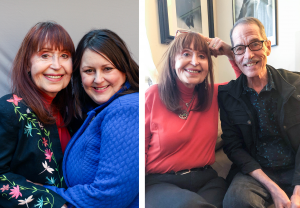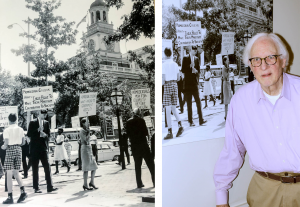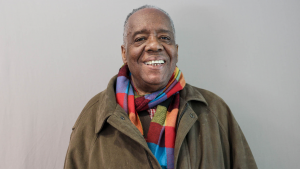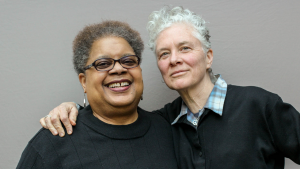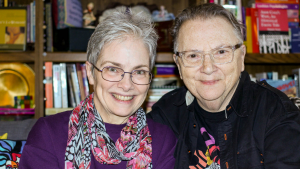<THEME MUSIC>
Jasmyn Morris (JM): Many people come to StoryCorps with a loved one… to talk about the things that matter most in their lives… But for some… finding someone to even have that conversation with can be tough…
According to SAGE … a nonprofit that looks out for LGBT elders… loneliness is a real issue for many older folks… 1 in 3 live alone… and half who have considered living in a senior home… say they feel like they’d have to go back into the closet.
… and so for this week’s episode… we brought StoryCorps to a special place in Philadelphia’s so-called “Gayborhood…”
It’s the StoryCorps podcast from NPR… I’m your host Jasmyn Morris…
<MUSIC>
This special place is a six-story brick building with a sign out front that reads John C. Anderson Apartments: An LGBT Friendly Community. It’s an affordable housing complex for those over the age of 62… and the majority of the people who live here identify as lesbian, gay, bisexual or transgender.
…and you’re about to meet eight residents… who have all led very different lives… but ultimately ended up here… in this one building… to live out their golden years together.
We’ll start by hearing from one of the first people to move in…
Elizabeth Coffey Williams (ECW): I’m Elizabeth Coffey Williams. I’m 71 years old; imagine that.
JM: Elizabeth sat down for an interview with her niece Jenn Coffey…
ECW: When I first came out to my family, it was the late ’60s, and a lot of the words that they have today, like transgender and non-binary, they didn’t have them.
Jenn Coffey (JC): Yeah…
ECW: You know, now that I think of it, all the fruits and nuts were already on the tree; but they just hadn’t been assigned names. So attempting to tell your extraordinarily loving blue-collar parents that you were transgender was tantamount to telling them I was from Jupiter.
And my parents were afraid, my goodness, this might be contagious, and they sort of whisked me away for a while, telling the rest of the family that I had just gone.
JC: That’s got to be traumatizing.
ECW: It was really traumatizing. I was 19 and it was years that I did not see my brothers or my sister. I would call. My mother would let me talk to them on the telephone but I couldn’t come home.
And at that point, I had heard they helped people like me in Baltimore at Johns Hopkins. It was, if not the only place, one of the only places in America where they had surgeons that would perform, at the time, people would use the word, sex change or gender reassignment–where today it’s far more common to say gender confirmation surgery.
But when I went to Johns Hopkins, I was completely unprepared. And I pushed open those big doors at Johns-Hopkins and said, ”Hi, I’m here.” They said, ”That’s not how it works. We have a whole program that you have to go through,” and I thought, ”I’m not really here for a shrink. I just want a plumber.”
JC: (Laughs) Good lord…
ECW: At first, they deemed me unacceptable. The way they were qualifying who they could help was actually slanted toward creating a few more suburban housewives. I mean, I was never going to be Betty Crocker. I was going to be Patti Smith. I was going to be Janis Joplin.
JC: Right.
ECW: But I did get through that program.
And later on, I ended up back here in Philadelphia, which was, I guess, ’73 or so…
My parents knew where I lived and, you know, my mother thought that it was time and she sat the kids down and she told them the truth, the big secret.
And then one day, there was a knock on my door, and I opened the door, and there was my little brother Billy, who was only 11 or 12. And he just looked up at me and said, ”Hi, it’s me.”
JC: (Laughs)
ECW: The next thing I knew, I was hugging and he was smiling and I was crying. Was he ashamed of me? Uh-uh, he wanted me back.
JC: Wow.
ECW: And when I opened that door, all I can say is it was like my heart was exploding and I was going to have family again. So it made me feel wanted and it made me feel loved. And that meant more to me than anything had meant in a long time.
<MUSIC>
JM: That’s Elizabeth Coffey Williams with her niece Jenn Coffey…
Elizabeth spends a lot of time in the building’s community garden… where she can often be found working with her best friend and neighbor, Frank Potopa…
Frank Potopa (FP): When I met you Elizabeth, one of the first things I learned was that you were trans.
ECW: How did you feel about that?
FP: Well, I didn’t have very much experience with trans people but it turns out it was time for me to become best friends with a trans lady.
ECW: Aww…
That’s been five years and we have the garden.
FP: Yeah, like me you’re also a worker.
ECW: I try. Right now the garden is waking up. It’s April, so it’s rainy; the dirt is wet, the weather is unpredictable but to just have a friend that I know I can rely on is enormous.
Whether we’re dressing up and going to some swanky little ‘do once in a while or whether I’m covered in mud, you still have the same smile for me. And that means the world. I feel really safe when I’m with you.
FP: Same here…
ECW: Something that I always notice when someone walks in come June, when it looks like paradise out there, you never say, Look what I did. You kinda just smile and say, “Hi, welcome to our garden.”
FP: Yeah, it’s part of what makes this place wonderful but it also shows what a bunch of old LGBT people can get done.
<MUSIC>
JM: That’s Frank Potopa with his best friend and gardening buddy… Elizabeth Coffey Williams.
Their garden has won multiple awards and is a gathering place for residents… no matter what season it is.
<MUSIC OUT>
When you first walk into this building and step into the lobby … it’s hard to miss a large black and white photograph framed on the wall. It shows people marching outside in a public park… holding signs with slogans demanding equal rights.
This picture was taken in 1965 at one of the first organized demonstrations for gay rights in the country… that’s four years before Stonewall. This protest continued for the next few years… and became known as the Annual Reminder… reminding people around the country that LGBT folks did not have basic civil protections.
One of the protesters in this photo… who looked young and… frankly… terrified then… is 78 years old now and he’s a resident in the building.
His name is John James. At the time… he was working a government job as a computer programmer.
John James (JJ): At that time in my life, just being gay was enough to get fired from the federal government. But, uh, I liked my job; I didn’t want to get fired, so you just had to be quiet about it.
But there was a gay demonstration at the building where the Constitution was drafted and it was on July 4, 1965. This the first time this had been done. I was 24 at the time.
And, uh, they insisted that we wear suits and the women wear dresses and, uh, I selected a sign to carry: Homosexuals Should Be Allowed To Make Their Full Contribution To Society. We were all a bit nervous. Were we gonna be arrested? Was there gonna be violence?
But the bus let us off; we walked around in a circle a couple hours.
And I remember it was a very hot day. At one point I retired from the line and bought a popsicle from the guy with the ice cream truck. We had a brief conversation, and he said, ”Some things I thought I would never do,” obviously meaning selling ice cream or anything else to homosexuals. (laughs)
The mainstream press wasn’t covering us, so I didn’t realize that there was a picture until the 50th anniversary of the Reminder. I didn’t realize that picture existed. And I think I look all nervous in the picture, but I’m happy I was there at the time and was able to help out.
So the movement goes back a long ways. The idea was reminding the country that gay people want to be free too. But, uh, we didn’t realize it would be remembered as such an important part of the movement.
<MUSIC>
JM: That’s John James remembering the 1965 demonstration that became known as the Annual Reminder.
Along with the historic photograph from that day… another fixture in the building’s lobby is Roosevelt Adams… a resident who often holds court in the seating area there. Most people call him “Rosy” and he seems to know everyone in the building…
Roosevelt Adams (RA): Everybody says when you get older you have to man up. I’ve been called a sissy all my life, so that’s a challenge for me. (Laughs)
I think I realize I was gay since birth. I didn’t fashion myself behind anyone in particular. I think I was my own gay role model, but my real role model actually was my mom.
She taught me how to take care of myself. She taught me how to cook, how to sew and she loved me to death. She never said anything to me about having boys come over but she would always tell my sister, ”If you get pregnant, you can’t live here.” My sister said, ”Well, what about him?” She said, ”He’s not gonna get nobody pregnant.” (Laughs) So she knew.
And after awhile, we moved to the projects and that’s how I became real close to my friend, being that he lived next door to me. So he would always come over after school. I would fix him pancakes or tuna fish sandwiches. His mother would often call, ”Is my son over there?” He’d be asleep in my room. So we spent an awful lot of time together.
After awhile, we started seeing each other, which I found it to be an American dream–Who doesn’t want to fall in love with the boy next door? (laughs) It was a good relationship and we’ve been friends now for 53 years. We’re not physically involved but we emotionally and spiritually are involved.
Most people have intimate family, you know, close family. He’s my close family. It’s just good to have someone in your life that you can say you love and they love you in return. That’s what’s most important to me.
<MUSIC>
That’s life-long Philadelphian Roosevelt Adams…
We’ll get to know more residents of the John C Anderson apartments…. After this short break.
Stay with us…
<MUSIC OUT>
<MIDROLL AD>
JM: Welcome back.
Even with a community like the one at the John C. Anderson building… it can still be hard to make new friends…
And so next… we’ll meet two of the more recent residents… who took their StoryCorps interview as an opportunity to get to know each other better…
PC Wilson (PCW): Hi, my name is PC Wilson.
Katherine Allen (KA): My name is Katherine.
PCW: The first time we met, I think you were moving in and you introduced yourself to me.
KA: I said, ”PC, does that stand for pretty cool?” And you said, ”Pretty cute.” (laughter)
PCW: You know, when I first moved in here, I didn’t realize how isolated I was, really.
KA: Yeah…
PCW: Meeting new people now is hard for me but it’s also fun. I’m more relaxed around people now and I think being here has helped do that.
But I still worry about what’s it going to be like when I really get to a point where I’m not able to take care of myself. I don’t have children, so I don’t know who’s going to take care of me?
KA: At this age, that’s a tough one, I think, being single and being gay. But I just thought of this term neighbors with benefits–Not those kind of benefits–but, you know…
PCW: Yes. I had to go to the emergency room one night. And Mary and Sue, they insisted on going with me, and staying.
KA: That sounds like them.
PCW: And I would not have had that if I had not moved here.
KA: You know, we’re this extended family because of shared experience. You know like, if you need anything, call me up.” And it’s not just BS, I really mean it.
This conversation, PC, has made me feel like we’re going to have some other conversations. (Laughs)
PCW: I agree. Now, you know, we’ve gone past hello, and a hug a little once in awhile. Maybe more hugs, more conversation. But I think this is a really good start for a friendship.
KA: Yeah, me too.
<MUSIC>
JM: That’s PC Wilson with her neighbor — and new friend — Katherine Allen.
They recorded their interview in Katherine’s apartment… which is just across the hallway from Mary Groce and Susan Atlas… who they mentioned in their recording.
Mary and Susan first met years ago… when their lives looked completely different. Here’s Susan…
Susan Atlas (SA): I grew up in the ’40s and ’50s and the thing was get married, have babies, and I did what I was supposed to do.
I was not in touch with my feelings; I didn’t know I had any, but I was heading into a severe depression. And when I finally found out what a therapist was, she asked me something about, ”What do you feel about women?” or something like that. It was a 55 minute session and, for 54 minutes, I didn’t speak a word.
Mary Groce (MG): Wow…
SA: And I just said, ”lesbian,” and she said, ”Time’s up, I’ll see you next week.”
So I picked a lesbian coming out support group that was far away from home.
MG: You were one of the last ones to walk in, I remember. It just seemed like a hush came over the room. I was intrigued instantly. I built up my confidence to give you a phone call, and…
SA: And when you called me I was shivering in my boots. This woman wants to go out with me.
MG: I sure did.
SA: Oh my God. What do I do now?
MG: On that first date, we started talking and, um, we just couldn’t stop, so we’ve been talking ever since.
SA: I think I was 51 when we met; luckiest day in my life.
<MUSIC>
JM: About ten years into their relationship… Mary and Susan both began having health issues… and eventually had to stop working. So they were in a tough place financially…
…but that’s when a room opened up in the John C Anderson building…
SA: We knocked on the door here and the building manager said, ”We have an apartment. How soon can you move?” And I said, ”I’ll call the truck. We’ll be there tomorrow.”
MG: Yes. (Laughs)
SA: We had, I think, ten cents left over after paying the movers, but we’re here.
MG: Maybe… (Laughs)
SA: We walked in the door, people embraced us, they held the door open for us and it was just joyful.
MG: It was.
SA: And we’re becoming a family here. One day you wake up and you say, most of my life is behind me. But every day that we wake up is just fabulous.
MG: Yeah, it’s a gift.
SA: And I gotta tell you, it sounds awful, honey, what we’ve been through but I keep smiling because you’re here.
<MUSIC>
JM: That’s Mary Groce and Susan Atlas at StoryCorps in Philadelphia, Pennsylvania… who live in one of the 56 LGBT-friendly apartments in the John C Anderson building…
…and it’s worth noting… buildings like this are rare. There’s currently a hundred person-long waitlist to get into an apartment there.
<MUSIC>
That’s it for this episode of the StoryCorps podcast… Special thanks to all the residents of the John C Anderson apartments for welcoming us with open arms.
This episode was produced by Jud Esty-Kendall, Danielle Roth, and me. Afi Yellow-Duke is our production assistant. Our engineer is Jarrett Floyd. Natsumi Ajisaka is our fact checker.
You can see that photo we mentioned earlier… the one that hangs in the lobby of this building… featuring one of the residents marching in the very first Annual Reminder… on our website. StoryCorps -dot-org.
….and remember… we’re asking you to pick up your mobile device and record stories of LGBT elders in YOUR community… using the StoryCorps app. Head over to storycorps.org – slash- outloud to learn more.
For the StoryCorps podcast… I’m Jasmyn Morris. Thanks for listening.
<MUSIC OUT>
